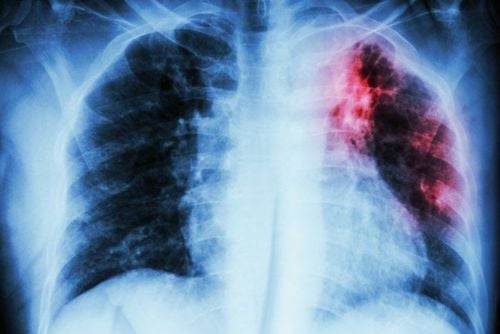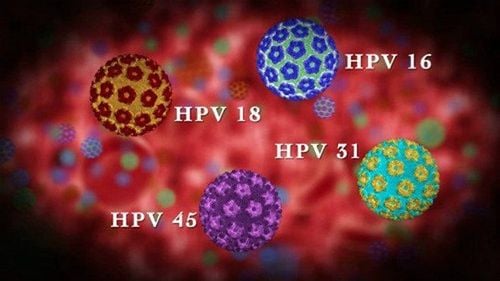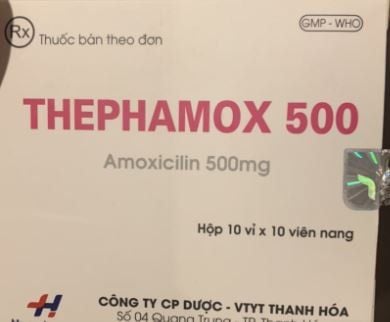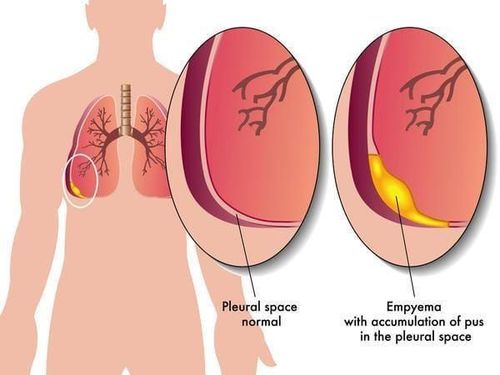The article was professionally consulted by Second Degree Specialist Nguyen Van Thai - Department of Otolaryngology and Head and Neck Surgery - Vinmec Danang International Hospital. Dr. Thai has more than 17 years of experience in treatment, especially in the field of Head and Neck Surgery.
Sore throat and coughing up blood are critical symptoms. If not treated promptly and properly, they can lead to serious health complications such as respiratory tract infections, ear, nose, and throat cancers, lung cancer, and even death.
1. Distinguishing the symptoms of sore throat, coughing up blood from other similar symptoms
Coughing up fresh blood is observed when blood appears in sputum during intense coughing. The sputum may contain bright red or pink blood. Before coughing, patients may experience a burning sensation behind the sternum, chest pain, and a sore throat. The amount of blood tends to decrease with subsequent coughs and eventually subsides.
Throat Inflammation with Blood from the Nasopharynx
In this case, blood appears in the sputum without the need for forceful coughing. It may be accompanied by other symptoms such as nosebleeds, oral health issues, nasal polyps, or more severe conditions like nasopharyngeal cancer. These signs are often associated with diseases of the ears, nose, throat, bronchial tubes, or lungs.
Vomiting Blood
Blood may also be expelled from the esophagus, but in this case, it is mixed with food and lacks foam. This symptom is often accompanied by abdominal pain and is related to gastrointestinal diseases such as cirrhosis, peptic ulcers, or complications from long-term use of pain relievers.
2. Is a Sore Throat with Coughing up Blood Dangerous?
Coughing up blood due to a sore throat is a symptom of many serious conditions, such as bronchitis, bronchiectasis, tuberculosis, lung cancer, nasopharyngeal cancer, and others. It can be confirmed that this condition is very dangerous. Without early and proper treatment, it may lead to severe health complications and even death.

3. Causes of Sore Throat with Coughing up Blood
Upper respiratory tract injury
Damage to teeth, gums, or any part of the upper respiratory tract can cause a sore throat with bloody phlegm. The cause of damage is due to grinding teeth while sleeping, eating and drinking, brushing teeth incorrectly, and eating hot and cold foods irregularly affecting the throat...
Upper respiratory tract infections such as pharyngitis, Tonsillitis, rhinitis, nasopharyngeal cancer, ... cause sore throat. This causes the throat lining to swell and become congested. When there is pressure, the blood vessels in the throat lining burst and stick to the phlegm.
Infection
Bacterial or viral infections such as Staphylococcus aureus, Pseudomonas aeruginosa, or Aspergillus fungus can cause bloody sputum in the throat.
Diseases of the bronchi and lungs
Pulmonary embolism, bronchitis, pneumonia. Common symptoms: Severe shortness of breath, wheezing, low-grade fever. Coughing up blood, chest pain, constant fatigue.
Other diseases
In addition, some other diseases can cause sore throat with coughing up blood such as pulmonary vein thrombosis, pulmonary edema, lupus erythematosus
4. Sore throat and coughing up blood are symptoms of what disease? How to diagnose the condition correctly?
4.1. Pulmonary tuberculosis
Tuberculosis is one of the most common infectious diseases in Vietnam. Therefore, it is a very common cause of coughing up blood.

Symptoms of the disease
In addition to the symptoms of coughing up fresh blood, individuals with tuberculosis may present with other symptoms such as: Coughing up phlegm for more than 2 weeks with fresh blood or blood in the phlegm, either in small amounts or more pronounced. Along with that, the patient has symptoms of mild fever in the afternoon, chest pain, night sweats, shortness of breath, poor appetite, fatigue, weight loss, ....
Diagnosis
Pulmonary tuberculosis is a disease that is easily transmitted through the respiratory tract and leaves many sequelae. Therefore, patients with the above symptoms should consult a doctor immediately. Diagnosis typically involves chest X-rays and sputum tests to confirm the condition.
4.2. Bronchiectasis
Bronchiectasis is one of the complications of pulmonary tuberculosis, due to chronic infections in the lungs such as lung abscess or pneumonia due to foreign body aspiration,... This is the cause of coughing up blood.
Bronchiectasis is one of the complications of pulmonary tuberculosis, due to chronic infections in the lungs such as lung abscess or pneumonia due to foreign body aspiration,... This is the cause of coughing up blood.
Symptoms of the disease
The sign of detecting the disease is coughing up blood in small amounts (about 1 teaspoon from 3 - 5ml). This phenomenon recurs over 3 - 5 days. If untreated, the condition can worsen, leading to massive bleeding of more than 100ml, which as a high risk of mortality.
Diagnosis
Bronchiectasis is diagnosed through chest X-ray and chest CT with contrast. Once the cause of the disease is determined, doctors will proceed with surgical treatment to remove the affected lung lobe or embolization to stop bleeding.
4.3. Respiratory tract infections
Common infections include acute pneumonia, necrotizing pneumonia, lung abscesses, pulmonary fungal infections, and pulmonary fungal masses.
Symptoms of the disease
Some symptoms of respiratory infections are fever, coughing up blood in the morning, and pleuritic chest pain.
Diagnosis
Detection of the disease is mainly through diagnosis by blood tests, chest X-ray or chest CT scan, and sputum analysis.
4.4. Cancer in ENT
Nasopharyngeal cancer
Nasopharyngeal cancer, throat cancer, laryngeal cancer, oral cancer, ... are the most common cancers in Vietnam. These cancers are common in individuals with frequent smoking, alcohol use, and unhealthy diets, …
Symptoms of the disease
Some symptoms of nasopharyngeal cancer include bad breath, loose teeth, pale or discolored tongue, and difficulty swallowing. When having nasopharyngeal cancer, the area with the tumor will have signs of ulcers, bad odor, blockage in the throat, choking, difficulty swallowing, coughing up blood...
Diagnosis
Cytological diagnosis: Use a cotton swab or specialized tool to wipe the tumor tissue in the dome. The purpose of the method is to get an early preliminary diagnosis.
Pathological diagnosis: Nasal and oropharyngeal biopsy is the decisive factor for diagnosis. In special cases, indirect diagnosis must be made through cervical lymph node biopsy.

Laryngeal cancer
Laryngeal cancer is more common in men than women. It ranks second in prevalence among ENT cancers after nasopharyngeal cancer.
Symptoms of the disease
Some symptoms of laryngeal cancer are hoarseness, difficulty swallowing, and swollen lymph nodes under the jaw. In addition to noticing a bad smell in the throat, patients can also clearly see obstacles blocking the neck, coughing up blood-stained phlegm, swollen throat, pain, ... In the case of laryngeal cancer, patients also lose their voice, pain spreads to the ears, itchy cough, and coughing up blood.
Diagnosis
Diagnosis of laryngeal cancer includes definitive diagnosis and staging diagnosis. Laryngoscopy is a method that helps to observe the patient's larynx. In addition, the doctor will perform additional tests: CT scan, and biopsy. For pathology analysis
4.5. Lung cancer
Lung cancer, also known as bronchial-lung cancer, is the second most common cancer in the world.
Symptoms of the disease
Symptoms of lung cancer may include frequent coughing, and persistent coughing with sputum, leading to changes in voice causing hoarseness, and occasionally coughing up blood. Heavy breathing, wheezing. Loss of appetite, difficulty swallowing, unexplained weight loss, and constant fatigue. Bone and joint pain, swelling in the neck and face. Pain in the back, chest, and shoulders, especially when carrying heavy objects or during coughing or laughing.
Diagnosis
The doctor will combine sputum tests, chest X-ray, and CT scan to diagnose the disease.
4.6. Lung cancer
In addition to the above malignant diseases, coughing up blood with pink foam is also a sign of lung cancer.
Symptoms of the disease
In its early stages, lung cancer often has no symptoms, making it challenging to detect. Smokers are at a higher risk. If this condition persists, the patient will have other symptoms such as chest pain, shortness of breath, persistent cough, weight loss, coughing up blood...
Diagnosis
Diagnosis is made through several tests such as chest X-ray, contrast-enhanced chest CT scans, tumor biopsy, and bronchoscopy. Depending on the severity and condition of the disease, doctors will indicate the most appropriate treatment method.
5. What should I do when I have a sore throat and cough up blood?
5.1. Medical Management
Coughing up blood is categorized into 3 levels of severity. When this condition is only in the early stages, it is necessary to monitor to detect the cause. Some notes to take when the patient has a sore throat and coughs up blood:
- If the patient has a mild blood clot, it can be resolved with bronchoscopy to remove clots.
- In cases where the amount of blood secreted into the blood vessel is quite large, the specialist will perform minor surgery to close the blood vessel by bronchial angiography as well as embolization.
- If the patient has a bleeding disorder, a blood transfusion will be used to maintain adequate blood supply to the body.
- Not only that, there are also folk remedies that are combined to supplement treatment. However, this solution is only effective for specific individuals. The origin of the bleeding must be determined first.
5.2. Nutrition
In addition to getting proper rest and avoiding heavy work, patients need to have a proper diet.
- Recommended foods for individuals who cough up blood are honey, horses’ hooves, blood porridge, lotus root porridge, pork, fresh fruit... These foods are healthy and help to boost health and reduce coughing.
- In addition, patients need to pay attention to foods such as spicy foods, seafood, alcohol, beer, chicken, roasted peanuts, and foods that cause allergies... which will make your cough worse.
If symptoms persist after 2–3 days, patients should seek immediate medical attention.

5.3. Lifestyle habits
In addition to treatment, individuals can alleviate symptoms through simple lifestyle habits such as:
- Drink plenty of water every day: drink at least 8 glasses of water to thin out phlegm and mucus in the throat.
- Gargle with salt water: Salt water soothes the throat, reduces inflammation, warms the throat, and thins mucus quickly. To get rid of phlegm faster, you can add eucalyptus essential oil to hot water to create a mouthwash.
- Regularly blow your nose to prevent mucus from draining in.
- Limit exposure to irritants found in paints, household cleaning agents, chemicals, and tobacco smoke.
- Use peppermint or eucalyptus essential oils... for steam inhalation or bath to help clear phlegm quickly.
Sore throat and coughing up blood are signs of respiratory tract damage, which, if prolonged, can lead to dangerous complications. Therefore, at the onset of a sore throat or when experiencing coughing up blood, it is important to visit a medical facility for examination and treatment. Additionally, improvements in both diet and daily habits should be made to facilitate faster recovery.
The Otolaryngology Department at Vinmec International Hospital specializes in diagnosing and treating common ear, nose, and throat conditions such as sore throat, tinnitus, non-allergic rhinitis, throat cancer, tumors in the head and neck region, and congenital anomalies of the ear, nose, and throat. These conditions are addressed using common surgical methods.
Please dial HOTLINE for more information or register for an appointment HERE. Download MyVinmec app to make appointments faster and to manage your bookings easily.














